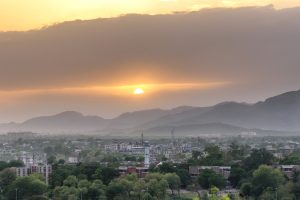Pakistan, despite its contribution of only 0.9 percent to global greenhouse gas (GHG) emissions, is highly vulnerable to the impacts of climate change. While the government of Pakistan has made commendable efforts in addressing environmental challenges through its current climate change policy, there are critical areas that require evaluation and improvement. Specifically, issues such as coal-based power generation, importation of used vehicles, operation of traditional brick kilns, rapid urbanization, and agricultural burning significantly contribute to pollution and environmental degradation in the country. To effectively tackle these challenges, a comprehensive policy reorientation at the national level is essential.
Pakistan presently adheres to Euro II and Euro III emission standards for gasoline and diesel fuels, respectively. However, the country has made limited progress toward implementing Euro VI emission standards. Additionally, there are ongoing projects and plans for the development of new coal-fired power plants, both domestically and through foreign investments.
Another pressing concern is the high number of older vehicles in circulation, coupled with the lack of comprehensive vehicle scrappage programs. Traditional brick kilns, employing outdated and inefficient technologies, contribute to air pollution, deforestation, and environmental degradation, too. Furthermore, rapid urbanization in Pakistan poses numerous challenges in terms of infrastructure, housing, transportation, and environmental sustainability. The lack of proper planning and uncontrolled urban development strain resources, lead to inadequate infrastructure, and cause further environmental degradation.
Agricultural burning, particularly in Punjab after the rice and wheat harvesting seasons, adds to the environmental concerns. Farmers resort to burning crop residues, such as rice straw and wheat stubble, due to limited time between harvest and planting seasons, labor constraints, and the absence of affordable alternatives for residue management.
Industrial pollution, waste management, construction and urban development, as well as indoor air pollution caused by inefficient cookstoves and dirty fuels, are also critical priority issues in Pakistan. However, the existing mechanisms for implementation and monitoring of policies in these areas have proven to be ineffective.
Moreover, the initiation of billion-dollar projects like the Billion Tree Tsunami by the government raises skepticism about the credibility of linking such initiatives to the mitigation of effects of climate change and environmental friendliness. This, coupled with Pakistan’s heavy reliance on foreign loans, raises concerns about the country’s economic stability.
Pakistan has sought support from the international community, particularly in light of the damages caused by the floods in 2022. The government appealed for recognition that the costs of climate change should be shared by developed countries, as they are the primary contributors. The reconstruction needs for post-flood recovery are estimated to exceed $16 billion. Efforts led by Bilawal Bhutto Zardari, the foreign minister of Pakistan, and Sherry Rehman, the climate change minister, have resulted in significant support. Generous pledges of over $9 billion were made during an international conference held in Geneva, providing much-needed assistance for reconstruction efforts.
Despite these efforts, there remains a lack of sufficient support and engagement from the government of Pakistan in addressing climate change on the global platform. The level of involvement and clarity regarding the government’s commitment to addressing climate change internationally is unclear. Pakistan needs to proactively engage in international climate forums, intensify diplomatic efforts to secure funding, and strengthen partnerships with other countries to collectively address this global issue.
Another critical shortcoming is the absence of a robust and dedicated institution to coordinate and integrate efforts among various stakeholders. Effective coordination and collaboration between government departments, scientific organizations, civil society, and the private sector are vital for implementing and monitoring climate change policies. Establishing a centralized institute to bridge these gaps, facilitate information sharing, and streamline decision-making processes is crucial for a coherent and impactful climate change strategy.
While the current climate change policy focuses on mitigation and adaptation measures, it must broaden its scope to address additional factors contributing to climate change. These include deforestation, unsustainable agricultural practices, urbanization, and industrial emissions. The policy should encompass comprehensive strategies promoting sustainable land use, responsible farming practices, urban planning prioritizing green infrastructure, and stringent regulations on industrial emissions.
While the government of Pakistan’s efforts for the rehabilitation of flood victims has shown commendable efforts, critical policy areas require immediate attention and improvement. Enhancing international engagement, establishing an effective coordination institute, and considering additional factors contributing to climate change will result in a more comprehensive and impactful climate change strategy. Prioritizing these aspects is imperative for effectively addressing climate change challenges and safeguarding the environment for future generations.

































